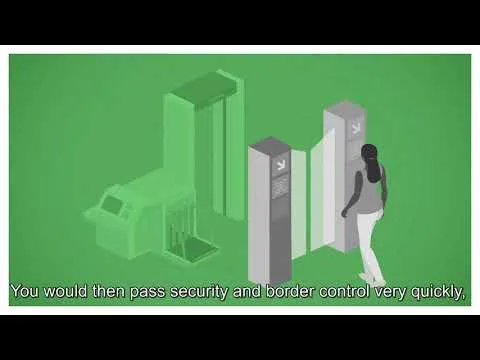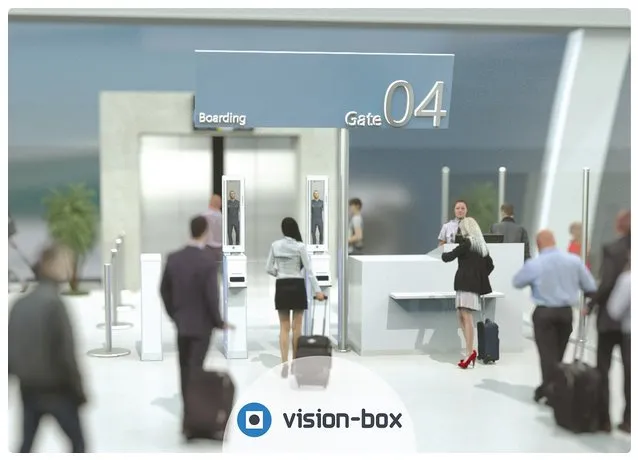
Image source
Hi all,
Yesterday, I stumbled across an article entitled Guangzhou Airport Rolls Out 'One ID' Facial Recognition Tech (the article is also available via China's state mouthpiece Xinhua).
Here are some key passages from the beginning of the article:
Guangzhou Baiyun International Airport has installed facial recognition technology across the airport to enhance passenger security, as reported by Xinhua.
The ‘One ID’ system being piloted at the airport is part of an international initiative in airports around the globe.
The goal is to apply the technology to security screening, check-in and luggage drop while compiling an information database for each passenger.
The drive to make airports smarter and more convenient comes from the International Air Travel Association (IATA).
The IATA insists that the future of air travel will soon be a document-free process with the implementation of biometric data collection at airports around the world. Thus, eliminating the need to show passports or boarding passes throughout the passenger’s experience at the airport.
Here’s an excerpt from the IATA official website on One ID:
“Passengers will be able to identify themselves at each airport touchpoint through a simple biometric recognition. The objective is to achieve a truly interoperable system coordination between airports, airlines and governments.”
The One ID facial-recognition system also recently completed a testing phase at Beijing Daxing International Airport, according to Xinhua.
Initial thoughts:
When I first read through the article, I was both surprised and not surprised at the same time.
In China, biometric identification is absolutely everywhere, particularly in metropolises like Shenzhen, Guangzhou, and Beijing.
Facial recognition "pads" are omnipresent in many companies around these cities; in some companies, they are literally scattered around each floor (wherever there is a door, elevator, you name it). Sure, staff still hold those old pesky ID cards they can swipe to get in and out, but in the past years they have been conditioned to chuck them in lieu of a "hassle-free" way to move around, namely sticking their faces in front of those pads. Probably unbeknownst to them, every single movement is tracked and databased, also with the help of security cameras that cover every square inch of any given workplace (with the exception of bathrooms).
So, the news about what is being rolled out at Guangzhou airport didn't really surprise me.
Rather, what caught my attention was that the IATA (International Air Travel Association) was involved.
The IATA's involvement:
In an earlier post of mine entitled International Air Travel to require COVID-19 Test or Vaccine | Immunity Passports I warned that the IATA was envisaging the implementation of more biometric identification and possibly biometric "Health Passes" on the back of the COVID-19 Scamdemic. Here is one short, but key, excerpt from that post:
In a May 5th, 2020 Press Release, the Director General and CEO of IATA - Mr. Alexandre de Juniac stated the following (alternate source here):
"The long-term solutions for COVID-19 depend on medical science. “We need a vaccine, an immunity passport or an effective COVID-19 test that can be administered at scale,” de Juniac continued."
In other words, some kind of "immunity passport" or "vaccine certificate" could be mandatory for international flights.
Though the COVID-19 scam is "somewhat" fading, it seems that they are nevertheless pushing for the need for "biometric identification" - and that at an alarming and forthcoming pace. (I must ask: Is anyone paying attention?)
What makes me say this?
Well, all one needs to do is have a look at what is being rolled out at other major airports around the globe.
Moreover, one can also critically examine the usual/typical propaganda being deployed to cement this new paradigm, a means of social engineering if you will.
Let's begin with some of the propaganda, and then we'll look at which airports are rolling out these dystopian procedures.
Propaganda pushing for biometric identification
1. In International Airport Review they recently (August 19) published an article entitled How COVID-19 has enhanced the need for One ID (well, at least a staff member of the IATA - Amandine Thomas did).
Here are some key propagandistic excerpts from the piece:
With the COVID-19 crisis, passengers’ concerns and demands are changing. According to a recent IATA COVID-19 Passenger Survey, once the pandemic has subsided and it has been declared safe to travel, 84 per cent of travellers would feel safer having touchless processing throughout the airport. This is complemented by 65 per cent of travellers being extremely concerned or somewhat concerned by handing over their passport/phone/boarding pass to airport officials. To reflect this and help contribute towards government-imposed travel restrictions being lifted, passenger confidence in air travel returning and the safe restart of aviation, IATA – through its One ID initiative – has refocused its efforts on two priorities.
Contactless processing
The first one is to deliver contactless passenger processing at airport touchpoints. Achieving this would minimise physical interaction between people and limit the exchange of documents; helping to protect passengers, as well as airline, airport, security and government employees from cross-contamination.
This is textbook PROBLEM-REACTION-SOLUTION folks. Never let a good crisis go to waste, they say.
It has been proven time and time again that using fear is the most potent form of mind control.
And in my view, the IATA is being complicit - whether knowingly/abidingly or stupidly/ignorantly - in this nefarious agenda.
Sure, one could argue that there could be advantages and certain merits with the implementation of such a system; but, the reality remains that these are not the primary reasons for its rollout.
The piece continues:
Information exchange
The second priority is ensuring the efficient exchange of information between passengers, airlines and governments in the face of growing information requests. It could contribute towards empowering passengers with the capability to comply with additional government requests during times of emergency
Two things here. First, the author is indicating an increase in demand from information about passengers by governments. Inherently, this means increased sharing of personal/private passenger information with governments. In other words, passengers' travel information will not only be sent to government agencies, but can also be tracked in real time.
Next, the statement "empowering passengers with the capability to comply with additional government requests" is ridiculously contradictory in itself; since when have passengers been "empowered" by "complying" with government requests? How can that make any sense? Aren't most government requests on single individuals bad in nature? The meaning of the word comply is to acquiesce to the demands of the other party. So, Amandine Thomas from the IATA who wrote this garbage is most likely trying hoodwink the reader (passenger) with a false sense that the government can be beckoned to bail them out of a bind.
The potential for abuse is enormous. Any dissenters can easily become blacklisted and barred from international travel should they become estranged by the "authorities" (whomever they may be). This can be easily be made integral to a kind of 'social credit system' like we see in China where over a million have already been banned from traveling by air or rail.
Simply put, if you "fall out of line" you can be punished by them restricting your ability to travel by air (or by other means).
2. DIGICONasia - No more passport fumbling and multiple ID-verification delays at this airport (August 21, 2020)
This headline is pure propaganda at its best: "no more passport fumbling". Wow. Really? Don't know about you, but when I take my passport out and hold it in my hand, I NEVER FUCKING fumble it. How about you?
Ridiculous.
The article goes on and one with the same BS talking points, so I will spare you the pain...
3. In another outlet - ETGovernment.com with a huge focus on everything "smart" and "digital" we see the same kind of roll out occuring in India but also thrust by Air Asia - the Asian aviation giant.
The headline reads DigiYatra Project: AirAsia India joins Bangalore International Airport to improve contactless boarding
Excerpts:
The ambitious DigiYatra project, a fully biometric based self-board solution for seamless flow from registration to boarding, which is operational at Bangalore International Airport (BIAL) has got bigger with Air Asia India joining the digital boarding journey
In an endeavour to further improve contactless and safe procedures for its guests, AirAsia India announced the adoption of the BIAL’s biometric journey at Kempegowda International Airport, Bengaluru (KIAB).
The Vision-Box developed and installed One-ID biometric platform technology, launched in July 2019 for Vistara flights, is now enabled for AirAsia India flights from Bangalore airport. DigiYatra is an industry-led initiative by the Ministry of Civil Aviation, wherein guests may automatically be processed based on facial biometric systems at checkpoints like Entry Point, Entry into Security and Aircraft Boarding.
Again, we have the facial biometric systems being rolled out.
What is noteworthy here, though, is the outfit that is providing the hardware and technology used for facial recognition, namely Vision-Box. I'll come back to Vision-Box later.
But first, more propaganda push:
Sunil Bhaskaran, MD and CEO, AirAsia India, said “To enable enhanced safety and security for our guests, AirAsia India has collaborated with Bangalore airport for the implementation of the DigiYatra facility. DigiYatra services are another step in our continuous focus on leveraging technology to redefine the new norms of travel with emergent solutions that alleviate the guest experience and enable social distancing.”
Wow. Isn't that wonderful? This new biometric system will keep us safe and secure and enable "much needed" social distancing. Again, they are piggybacking on COVID-19 fear. Bangalore airport compliant, check.
“At Bangalore airport, we have been following stringent safety and hygiene protocols. We believe that the tech-enabled biometric journey is another step towards healthy, secure and hassle-free travel. This project will continue the process of transforming passenger journeys - unleashing the power of the Country’s first all-biometric flow operation, where ‘your face is your boarding pass.
"your face is your boarding pass". I'm disgusted. Don't know what to add here...
The article goes on about how they won't use and abuse your privacy with the tracking information they collect (which they say they will be "delete within a few hours of flight completion"), but we all know this is a total lie.
Which airports are currently "on board" with this biometric roll out?
Now, let's look at a few examples of all-too-complicit airports (and airlines) that are willing to strip us of our travel privacy.
Japan - JAL, Tokyo Haneda Airport & Narita International Airport
- Japan Airlines Rolls Out Contactless Check In Options, August 26, 2020
Back in October 2019, the Japanese carrier announced facial recognition technology, otherwise known as “One ID.” The technology aims to speed up check-in times, making it more convenient for repeat JAL customers. Businesswire reports that the technology will be used across Narita International Airport, with the aim of expanding it to several countries worldwide.
What is interesting here is that they mention that as far back as October 2019 ("pre-" COVID-19 crisis), they were already envisaging the implementation of the "One ID" system and that the aim was to "expand it to several countries worldwide".
Hence, this was a concerted effort even before the scamdemic; so, the mention that all these biometric identification system are being rolled out to "keep us safe" is obviously not in line with the facts on the ground (that this was planned way before the COVID-19 sham).
Airlines such as United and AirAsia quickly implemented touchless check-in kiosks as soon as the virus proved to be a worldwide pandemic.
Budget carrier AirAsia introduced contactless check-in options as early as May. The machines are available across airports in Thailand, Malaysia, Indonesia, the Philippines, and Japan.
Fox World Travel also has published its own propaganda - Health Passports. Robots That Clean Airports. Masks Worn…Everywhere. The Future is Now..
Here is a key excerpt:
Nippon Electric Company (NEC) has developed a “One ID” check for Tokyo-Narita Airport that can authenticate identity even while passengers wear masks. It uses a facial recognition artificial intelligence (AI) engine called NeoFace that’s expected to increase the efficiency of clearing customs and reduce the number of airport personnel.Shopping has also been sped up by Amazon, which launched its Just Walk Out service at several airport kiosks recently; as at Amazon Go stores, the service automatically detects the goods in buyers’ carts and bills the customer
Now we have an indication about the software that may be used to power the hardware for facial recognition, namely an AI system engine called NeoFace. Sorry I haven't dug into this rabbit hole, but I'm sure I'd find much of the same nefariousness.
Furthermore, we see mention of airport kiosks with an Amazon Just Walk Out service. We know that Amazon has a horrible track record with regards to the privacy of customer information, not to mention its strong ties with US military and intelligence agencies.
In short, more tracking is in store for international travelers in the form of the shopping habits. And we know that this big data we be used to further push ads down our throats as well. How wonderful. Paying cash could keep your purchases somewhat anonymous, but by the time all of this is completely rolled out, we are likely going to be enmatrixed in a cashless system.
ADDENDUM: Neoface:
[ADDENDUM BEGIN]
Here is some information I found with regards to this Neoface biometric software that can provide facial recognition in real time. It is developed by the NEC Europe Ltd. a subsidiary of the Japanese behemoth NEC (Nippon Electric Company).
You can get details about their Neoface product on the following web page about "public safety" and referenced PDF file. Here is the cover image for the PDF document titled NeoFace Watch real-time face recognition - How does it work?:
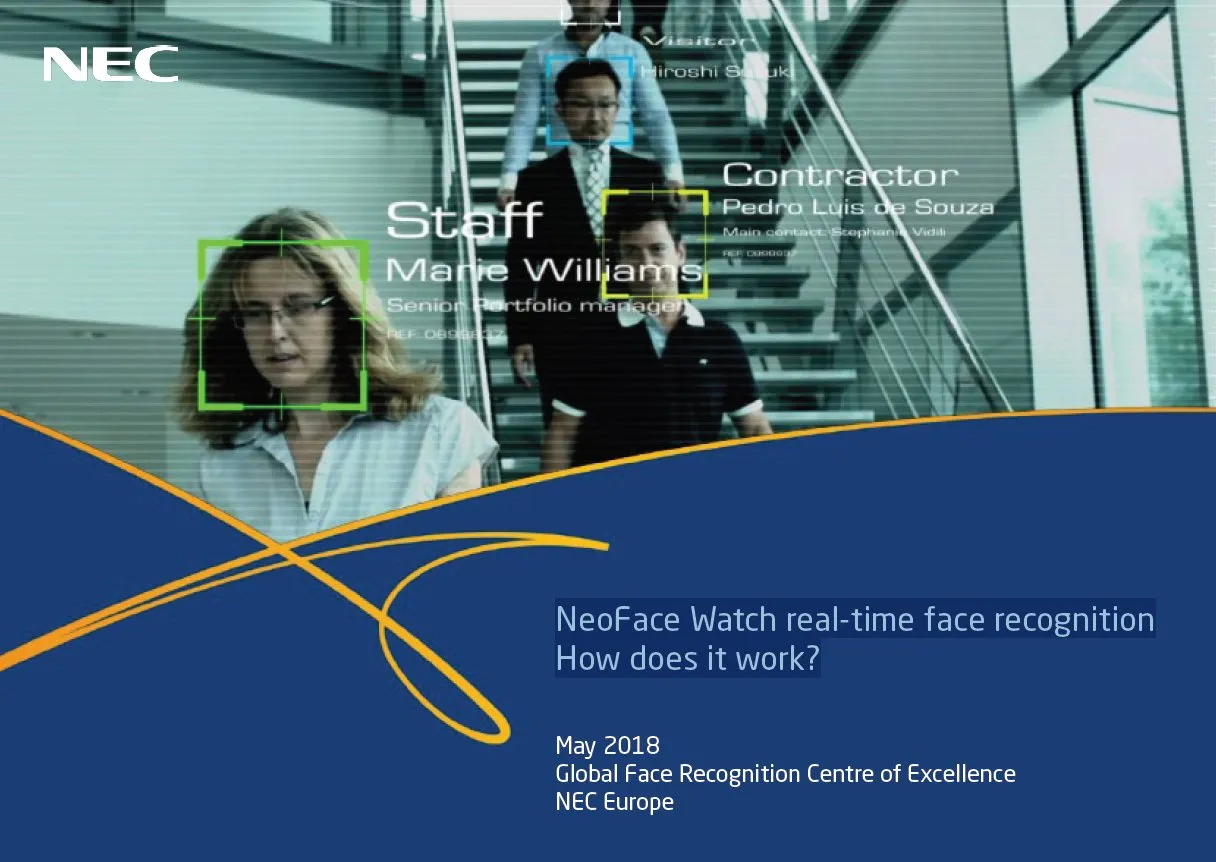
source (PDF)
Now, if that is not creepy enough for you, then you probably don't care about your privacy. This is exactly how the users of Neoface will be able to see you when you walk through an airport or other surveilled area. The PDF document is highly detailed should you care to know the nitty-gritty. A sneak peak:
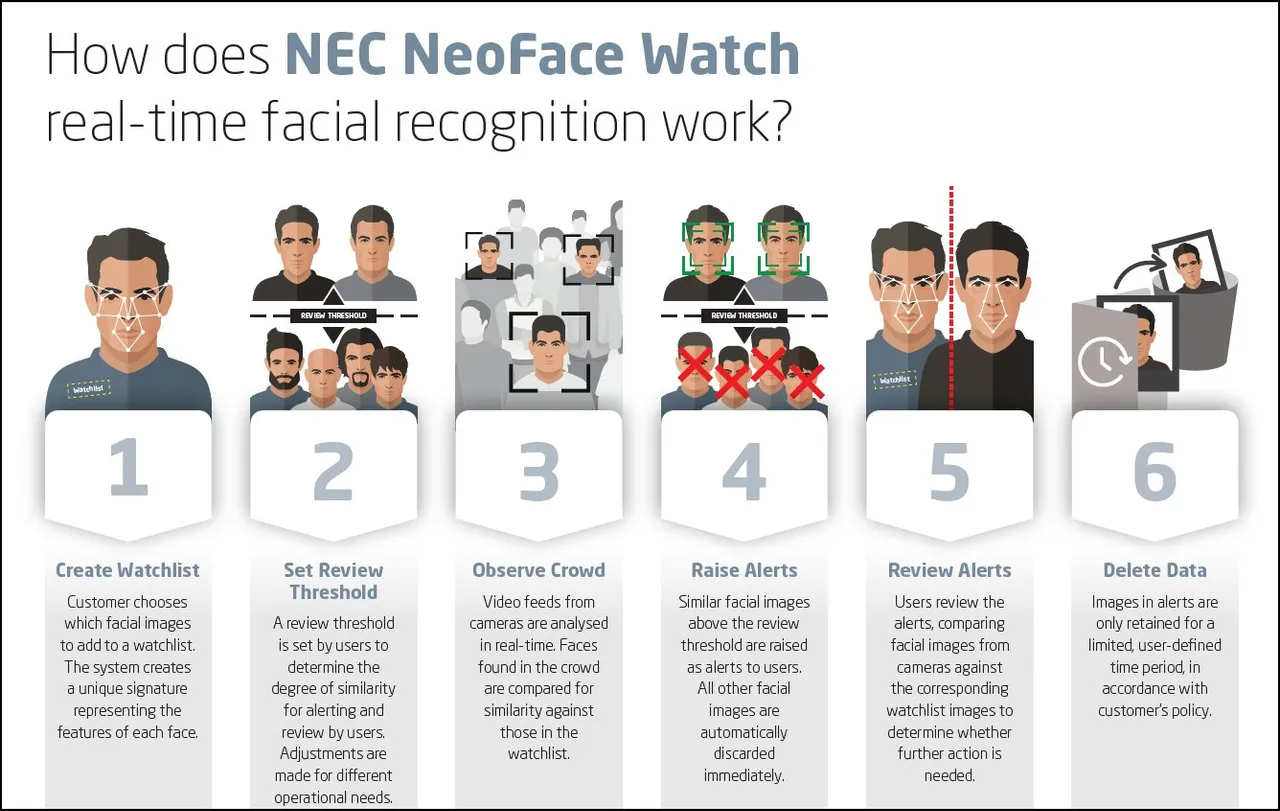
According to one source, Neoface "has been chosen by organisations in more than 50 countries".
Of those 50 countries, New Zealand seems to be all to willing to fork over 9 million dollars for police outfits to set up CCTV systems that have facial recognition. This last referenced article is very recently dated August 31, 2020 which makes one wonder if this is not being rolled out on the back of the infamous COVID-19 scamdemic. Furthermore, at least the article brings up a few other issues of interest:
Very few laws or rules expressly covering facial recognition's use existed either in the US or in New Zealand, she said.
Earlier this year, NEC promoted a Covid-19 mobile app that could notify healthcare workers and update a "management portal" if a person was symptom-free, with data stored on Amazon Web Services.
Ouch. Two important things here. First, the laws are indeed not clear about whether installing facial recognition systems in public places is legal or not. Currently, in the United States, this varies not only by state, but also by county or city. I am not sure about the laws in New Zealand and other countries; but, I think we should start looking into these. Next, we can see that NEC is promoting a Covid-19 mobile app to monitor health employees. Health employees now and in the not too distant future all employees. Finally, this data will be stored on Amazon servers which is highly worrisome given what I have stated elsewhere in this article.
One also has to wonder why the name "Neo" in Neoface? Did they choose the name based on the Neo character Keanu Reeves portrayed in the Matrix, or is this just all coincidental?
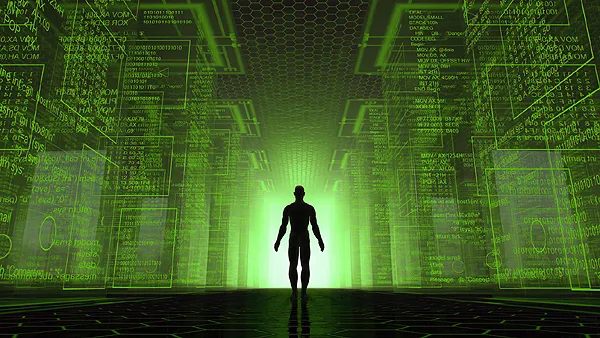
[ADDENDUM END]
USA - JFK Airport
- JFK and Vision-Box roll out facial recognition boarding, 13 May, 2019
Once again here, notice the date of publication - 13 May, 2019 - wayyyyy before Covid-19.
JFK Airport and TOGA have taken a visionary approach to passenger experience, welcoming the adoption of a seamless biometric-based passenger management platform as a strategic long-term growth pillar. A self-service biometric boarding solution will be implemented in Terminal 1 to offer a more convenient, faster boarding process.
International travellers will be allowed to board their aircraft in just a few seconds using biometric eGates, which will recognise them by their face. The platform will match the live faces with previously enrolled and stored ones: No need to present a passport or boarding pass.
TOGA Executive Director, Steve Rowland, said: “Biometric self-boarding is one of our top priorities – improving the passenger experience and enhancing security and safety for all those who travel at JFK Terminal 1. We are proud to pilot this unique, paperless, biometric boarding process, and CBP and Vision-Box have been tremendous partners in this effort.”
We have Vision-Box once again behind the hardware for this roll out at JFK.
In another article about JFK - JFK Airport Terminal One Group and Vision-Box to roll out facial recognition boarding (April 9, 2019) we see much of the same talking points with mention of such infrastruction being espoused buy other airlines including Lufthansa, Air France, Japan Airlines, Korean Airlines, along with the hardware enabler Vision-Box.
Vision-Box
Who is behind Vision-Box?
That's a great question. But unfortunately, I haven't been able to find a single name of an executive or employee from this company. It's people and culture web page lists none. Nor can I find a name from Dun & Bradstreet about this biometric firm, at least for its Princeton, New Jersey division. The D&B company page for Vision-Box lists a measly $35,842 in annual revenue for Vision-Box (though it doesn't state which year).
One would think that if a company that has secured (likely million dollar) contracts with numerous airports around the world for the implementation of the necessary hardware for all kinds of biometric facial recognition (and other) systems that we'd be able to know more about them.
They must be privately held.
In short, I need to ask again: who exactly is behind this outfit?
The fact that no information can be easily found about any of its executives or employees is highly suspicious at best.
If anyone cares to "deep dive" or investigate this, please do so and post your findings in the comments section below.
The most details I've been able to find about this company can be found at startus; so, perhaps this could serve as a starting point.
Will the IATA give us the option to "opt out" (of biometric identification)?
Last year, I advised a close friend who was visiting and flying out of Hong Kong International airport telling him that he could "opt out" of their new biometric facial id system (which was their policy at the time). And all he needed to do was to ask for a manager at the airport and state his desire not to use the system but rather ask an agent to confirm his identity with manual verification of his passport for which he did without too much hassle (only some strange looks).
But, I suspect this kind of "opting out" option will become more and more difficult as time goes by.
The article about Guangzhou airport I cited at the beginning of this article did mention something of the sort:
At this time, passengers who have registered for the service can reserve the right to decline airport access to their facial information at any time, according to the airport, as cited by Xinhua.
There is a bit of confusion with this statement though, as it says "passengers who have registered" can reserve the right to decline access to their facial info. To me, that would imply that upon registration, they would have had to get their face scanned (and therefore, it would already be inputed into a central database). Maybe (and hopefully), though, it can serve as one layer of privacy protection if the passenger can opt out of being scanned.
But realistically, what can we expect going forward once all these systems are no longer in "pilot" (pardon the pun) mode but are standard operating procedure?
I think we will have to keep tabs on further development with regards to the contined global roll out of a biometric identification system for air travel. A good place for this will be to monitor the press releases from the IATA (International Air Travel Association). Here are a couple of source articles regarding the One ID system:
- IATA - One ID
- IATA - One ID - Towards Contactless Passenger Processing (Virtual Classroom)
- archived - IATA PDF on One ID
- An IATA video about One ID (from a highly suspicious date - January 30, 2020):
Final Thoughts
It seems like what is happening here is practically irreversible.
Nevertheless, we still have rights to privacy even though these vary from country to country.
Accordingly, how will different jurisdictions (countries), airports, and airlines handle our private personal (and biometric) information? Under which laws, rules and regulations? With whom will they share it? What will they share?
These are questions that concern us all.
I think we better start caring more about them before it is too late.
God bless.
In Peace & Liberty (at least for now)
